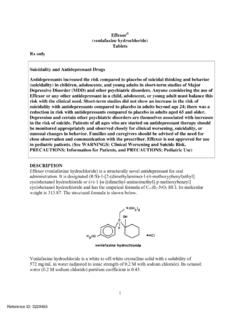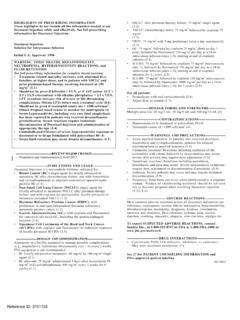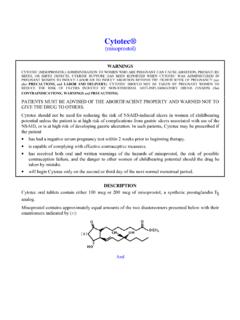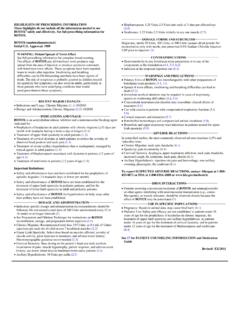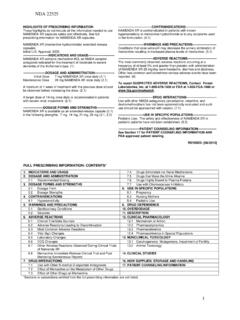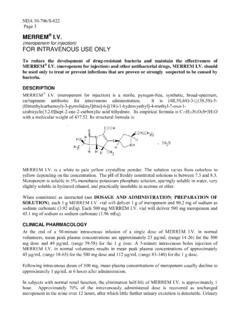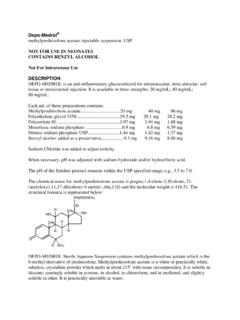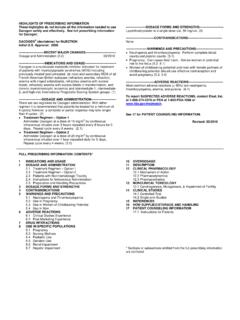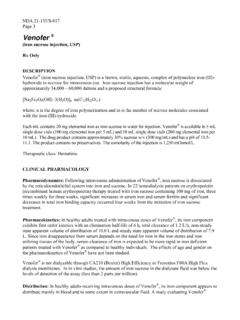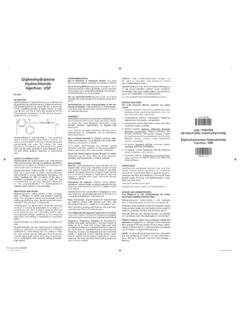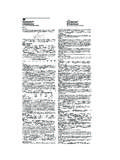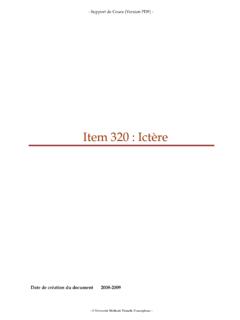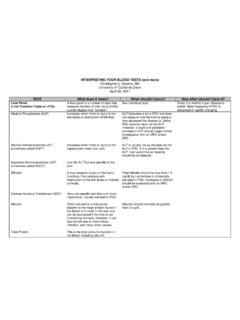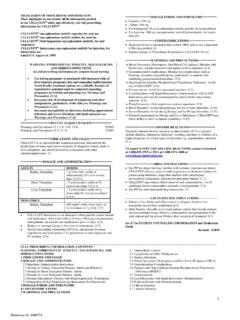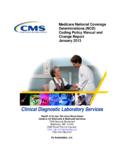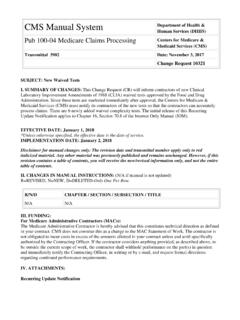Transcription of Reference ID: 3973669 - Food and Drug Administration
1 HIGHLIGHTS OF PRESCRIBING INFORMATION These highlights do not include all the information needed to use INVOKANA safely and effectively. See full prescribing information for INVOKANA. INVOKANA (canagliflozin) tablets, for oral use Initial Approval: 2013 -------------------------RECENT MAJOR CHANGES---------------------------- Dosage and Administration ( ) 05 /2016 Contraindications (4) 03 /2016 Warnings and Precautions (5) 08 /2016 ----------------------------INDICATIONS AND USAGE--------------------------- INVOKANA is a sodium-glucose co-transporter 2 (SGLT2) inhibitor indicated as an adjunct to diet and exercise to improve glycemic control in adults with type 2 diabetes mellitus (1) Limitation of Use.
2 Not for treatment of type 1 diabetes mellitus or diabetic ketoacidosis (1) -----------------------DOSAGE AND Administration ---------------------- The recommended starting dose is 100 mg once daily, taken before the first meal of the day ( ) Dose can be increased to 300 mg once daily in patients tolerating INVOKANA 100 mg once daily who have an eGFR of 60 mL/ m2 or greater and require additional glycemic control ( ) Assess renal function before initiating and periodically thereafter. ( ) Limit the dose of INVOKANA to 100 mg once daily in patients who have an eGFR of 45 to less than 60 mL/ m2 ( ) Initiation or use of INVOKANA is not recommended if eGFR is below 45 mL/ m2 ( ) ----------------------DOSAGE FORMS AND STRENGTHS-------------------- Tablets: 100 mg, 300 mg (3) -------------------------------CONTRAIND ICATIONS------------------------------ History of serious hypersensitivity reaction to INVOKANA (4) Severe renal impairment, ESRD, or on dialysis (4) ---------------------------WARNINGS AND PRECAUTIONS------------------- Hypotension: Before initiating INVOKANA, assess volume status and correct hypovolemia in patients with renal impairment, the elderly, in patients with low systolic blood pressure, or if on diuretics, ACEi, or ARB.
3 Monitor for signs and symptoms during therapy ( ) Ketoacidosis: Assess patients who present with signs and symptoms of metabolic acidosis for ketoacidosis, regardless of blood glucose level. If suspected, discontinue INVOKANA, evaluate and treat promptly. Before initiating INVOKANA, consider risk factors for ketoacidosis. Patients on FULL PRESCRIBING INFORMATION: CONTENTS* 1 INDICATIONS AND USAGE 2 DOSAGE AND Administration Recommended Dosage Patients with Renal Impairment Concomitant Use with UDP-Glucuronosyl Transferase (UGT) Enzyme Inducers 3 DOSAGE FORMS AND STRENGTHS 4 CONTRAINDICATIONS 5 WARNINGS AND PRECAUTIONS Hypotension Ketoacidosis Acute Kidney Injury and Impairment in Renal Function Hyperkalemia Urosepsis and Pyelonephritis Hypoglycemia with Concomitant Use with Insulin and Insulin Secretagogues Genital Mycotic Infections INVOKANA may require monitoring and temporary discontinuation of therapy in clinical situations known to predispose to ketoacidosis ( ) Acute kidney injury and impairment in renal function.
4 Consider temporarily discontinuing in settings of reduced oral intake or fluid losses. If acute kidney injury occurs, discontinue and promptly treat. Monitor renal function during therapy ( ) Hyperkalemia: Monitor potassium levels in patients with impaired renal function and in patients predisposed to hyperkalemia ( , 5. 4, , ) Urosepsis and Pyelonephritis: Evaluate patients for signs and symptoms of ur inary tract infections and treat promptly, if indicated ( ) Hypoglycemia: Consider a lower dose of insulin or the insulin secretagogue to reduce the risk of hypoglycemia when used in combination with INVOKANA ( ) Genital mycotic infections: Monitor and treat if indicated ( ) Hypersensitivity reactions: Discontinue INVOKANA and monitor until signs and symptoms resolve ( ) Bone fracture: Consider factors that contribute to fracture risk before initiating INVOKANA ( ) Increased LDL-C.
5 Monitor LDL-C and treat if appropriate ( ) ------------------------------ADVERSE REACTIONS------------------------------ Most common adverse reactions associated with INVOKANA (5% or greater incidence): female genital mycotic infections, urinary tract infection, and increased urination ( ) To report SUSPECTED ADVERSE REACTIONS, contact Janssen Pharmaceuticals, Inc. at 1-800-526-7736 or FDA at 1-800-FDA-1088 or ------------------------------- drug INTERACTIONS---------------------------- -- UGT inducers ( , rifampin): Canagliflozin exposure is reduced. Consider increasing dose from 100 mg to 300 mg ( , ) Digoxin: Monitor digoxin levels ( ) -----------------------USE IN SPECIFIC POPULATIONS----------------------- Pregnancy: Advise females of the potential risk to a fetus especially during the second and third trimesters.
6 ( ) Lactation: INVOKANA is not recommended when breastfeeding ( ) Geriatrics: Higher incidence of adverse reactions related to reduced intravascular volume ( , ) Renal impairment: Higher incidence of adverse reactions related to reduced intravascular volume and renal function ( , , ) Hepatic impairment: Not recommended with severe hepatic impairment ( ) See 17 for PATIENT COUNSELING INFORMATION and Medication Guide. Revised: 08 /2016 Hypersensitivity Reactions Bone Fracture Increases in Low-Density Lipoprotein (LDL-C) Macrovascular Outcomes 6 ADVERSE REACTIONS Clinical Studies Experience Postmarketing Experience 7 drug INTERACTIONS UGT Enzyme Inducers Digoxin Positive Urine Glucose Test Interference with 1,5-anhydroglucitol (1,5-AG) Assay 8 USE IN SPECIFIC POPULATIONS Pregnancy Lactation Pediatric Use Geriatric Use Renal Impairment Reference ID.
7 3973669 1 Hepatic Impairment 10 OVERDOSAGE 11 DESCRIPTION 12 CLINICAL PHARMACOLOGY Mechanism of Action Pharmacodynamics Pharmacokinetics 13 NONCLINICAL TOXICOLOGY Carcinogenesis, Mutagenesis, Impairment of Fertility 14 CLINICAL STUDIES Monotherapy Combination Therapy Studies in Special Populations 16 HOW SUPPLIED/STORAGE AND HANDLING 17 PATIENT COUNSELING INFORMATION *Sections or subsections omitted from the full prescribing information are not listed. Reference ID: 3973669 2 FULL PRESCRIBING INFORMATION 1 INDICATIONS AND USAGE INVOKANA (canagliflozin) is indicated as an adjunct to diet and exercise to improve glycemic control in adults with type 2 diabetes mellitus [see Clinical Studies (14)].
8 Limitation of Use INVOKANA is not recommended in patients with type 1 diabetes mellitus or for the treatment of diabetic ketoacidosis. 2 DOSAGE AND Administration Recommended Dosage The recommended starting dose of INVOKANA (canagliflozin) is 100 mg once daily, taken before the first meal of the day. In patients tolerating INVOKANA 100 mg once daily who have an eGFR of 60 mL/ m2 or greater and require additional glycemic control, the dose can be increased to 300 mg once daily [see Warnings and Precautions ( ), Clinical Pharmacology ( ), and Patient Counseling Information (17)]. In patients with volume depletion, correcting this condition prior to initiation of INVOKANA is recommended [see Warnings and Precautions ( ), Use in Specific Populations ( and ), and Patient Counseling Information (17)].
9 Patients with Renal Impairment Assessment of renal function is recommended prior to initiation of INVOKANA and periodically thereafter. The dose of INVOKANA is limited to 100 mg once daily in patients with moderate renal impairment with an eGFR of 45 to less than 60 mL/ m2 . Initiation of INVOKANA is not recommended in patients with an eGFR less than 45 mL/ m2 . Use of INVOKANA is not recommended when eGFR is persistently less than 45 mL/ m2 [see Warnings and Precautions ( ) and Use in Specific Populations ( )]. INVOKANA is contraindicated in patients with an eGFR less than 30 mL/ m2 [see Contraindications (4)]. Concomitant Use with UDP-Glucuronosyl Transferase (UGT) Enzyme Inducers If an inducer of UGTs ( , rifampin, phenytoin, phenobarbital, ritonavir) is co-administered with INVOKANA, consider increasing the dosage to 300 mg once daily in patients currently Reference ID: 3973669 3 tolerating INVOKANA 100 mg once daily who have an eGFR of 60 mL/ m2 or greater and require additional glycemic control [see drug Interactions ( )].
10 Consider another antihyperglycemic agent in patients with an eGFR of 45 to less than 60 mL/ m2 receiving concurrent therapy with a UGT inducer. 3 DOSAGE FORMS AND STRENGTHS INVOKANA 100 mg tablets are yellow, capsule-shaped, film-coated tablets with CFZ on one side and 100 on the other side. INVOKANA 300 mg tablets are white, capsule-shaped, film-coated tablets with CFZ on one side and 300 on the other side. 4 CONTRAINDICATIONS History of a serious hypersensitivity reaction to INVOKANA, such as anaphylaxis or angioedema [see Warnings and Precautions ( ) and Adverse Reactions ( , )]. Severe renal impairment (eGFR less than 30 mL/ m2), end stage renal disease (ESRD), or patients on dialysis [see Warnings and Precautions ( ) and Use in Specific Populations ( )].
